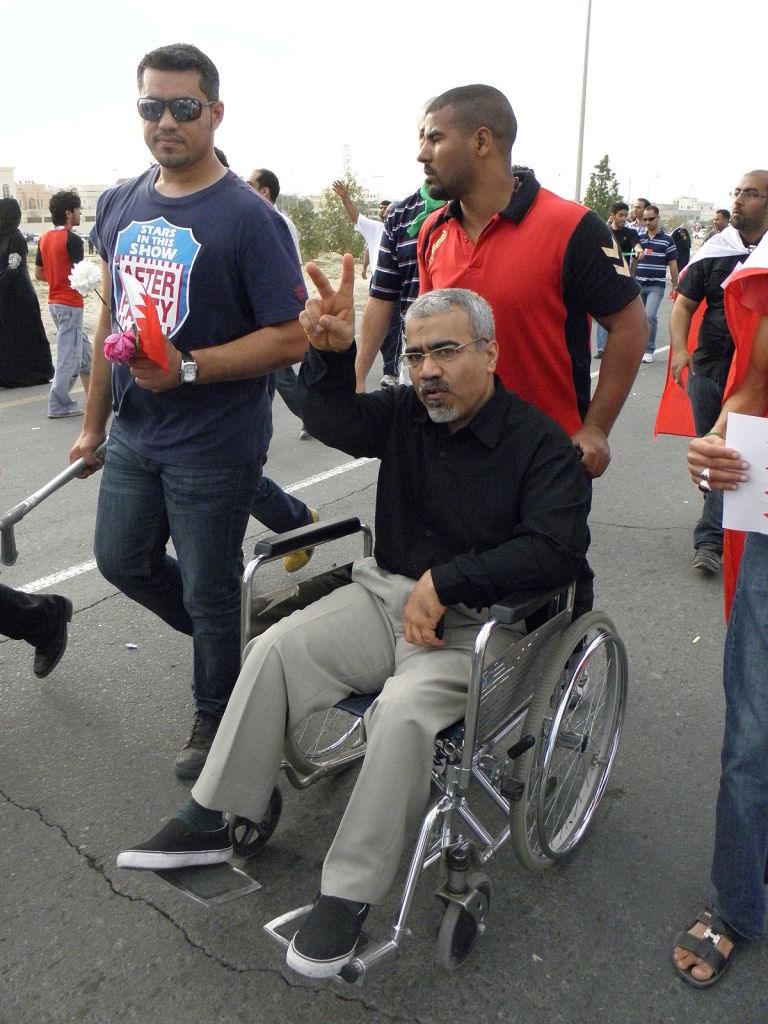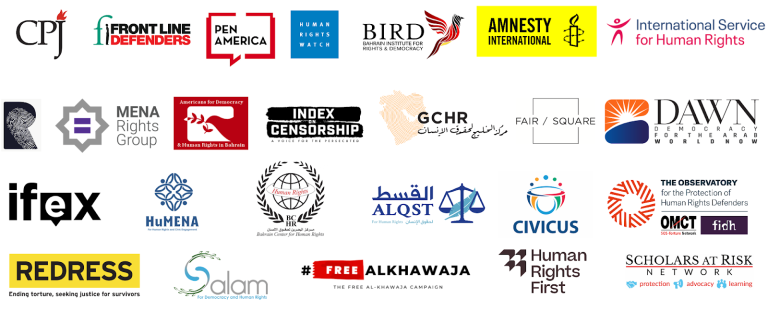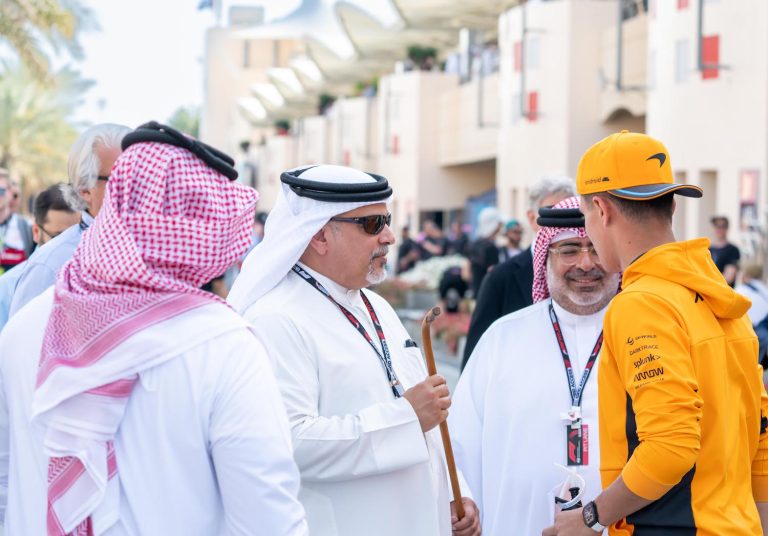Ahead of Bahrain’s UPR adoption at the 36th Session of the UN Human Rights Council on 21 September 2017, English PEN has joined fellow NGOs from across the world to call on our governments to demand better treatment for Bahrain’s detainees and to continue calling for the release of all those currently in detention simply for exercising their rights to freedom of expression, association, assembly, or belief.
Boris Johnson MP
Secretary of State for Foreign and Commonwealth Affairs
Foreign and Commonwealth Office
20 September 2017
Dear Secretary of State
We are writing to draw your attention to the ongoing arbitrary detention and ill-treatment of human rights defenders and other prisoners of conscience detained in Bahrain and to urge your government to take action on their behalf.
There are widespread concerns for the health and well-being of twelve high profile human rights defenders and political leaders in Bahrain who are serving lengthy prison sentences in Jau Prison solely related to their political and human rights activities.
The twelve prisoners are Abdulwahab Hussain, Mohammad Ali Ismael, Mohammad Hassan Jawad, Abdulhadi Al-Khawaja, Sheikh Mirza Al-Mahroos, Sheikh Abdulhadi Al-Mukhoder, Sheikh Abduljalil Al-Muqdad, Sheikh Mohammad Habib Al-Muqdad, Hassan Mushaima, Sheikh Saeed Al-Noori, Dr. Abduljalil Al-Singace and Sheikh Ali Salman. Eleven of them are serving sentences handed down by military court following unfair trials in June 2011, and upheld by civilian appeals courts in 2013; the twelfth, Sheikh Ali Salman, is the Secretary-General of the now-dissolved Al Wefaq political society, who was sentenced in 2015 on politically-motivated charges.
According to our information, they have been subjected to ill-treatment in detention, including being denied access to adequate medical treatment, having limitations placed on family visits, having their phone calls monitored and cut off, and being prevented from receiving medical treatment unless they are shackled, contrary to the UN Standard Minimum Rules for the Treatment of Prisoners (Mandela Rules). Specifically, prisoners are shackled from ankles to wrists, so many of these prisoners have not had medical appointments in six months. As well, their visits with family members have been reduced from two one-hour visits per month to two half-hour visits per month.
Of particular concern is the case of Dr. Abduljalil Al-Singace, detained by the Bahraini authorities for his role in nonviolent demonstrations during the 2011 pro-democracy movement and later sentenced to life imprisonment. Security personnel subjected Dr. Al-Singace to severe torture and mistreatment during his initial detention, including sexual abuse, beatings, two months of solitary confinement, and psychological abuse such as threats against his family.
The harm from this torture has been compounded by deliberate medical neglect. Dr. Al-Singace is a survivor of childhood polio and relies on a cane, crutches, or wheelchair for mobility. He also suffers from sickle cell anaemia, which causes periodic episodes of intense pain. Despite this, the authorities have not provided him with any medication since mid-March 2017. Furthermore, as a result of the new restrictions imposed by the prison administration, like arbitrary shackling, the authorities have failed to take Dr. Al-Singace to any of his scheduled medical appointments. The withholding of medication is due entirely to the actions of the prison administration and was condemned in a recent joint statement by ten human rights groups, including many of the undersigned organizations.
Dr. Al-Singace is just one of the thousands of political prisoners and prisoners of conscience suffering poor prison conditions and mistreatment in Bahrain. The twelve high profile prisoners of conscience regularly endure degrading treatment, such as disruption of prayer rituals and, in some cases, having their beards and heads forcibly shaved. The authorities have also subjected them to torture in the form of forced standing, verbal and sexual assault, beatings, and prolonged solitary confinement. The Government of Bahrain consistently refuses to investigate allegations of torture, and continues to deny them adequate medical care.
The Working Group on Arbitrary Detention (WGAD) has adopted opinions on two of the detainees in question, Abdulhadi Al-Khawaja and Sheikh Ali Salman, finding their detention to be arbitrary. We note that the remaining ten inmates were tried in the same case as Mr. Al-Khawaja and believe that their imprisonment also amounts to circumstances of arbitrary detention. On 28 February, your government signed a joint statement at the 26th Session of the UN Human Rights Council calling for the release of all persons imprisoned solely for exercising their human rights, including persons identified as arbitrarily detained by the WGAD.
In May, the United Nations (UN) Committee Against Torture found that “there continue to be numerous and consistent allegations of widespread torture and ill-treatment of persons who are deprived of their liberty in all places of detention [in Bahrain].” They noted that political prisoners, including Abdulhadi Al-Khawaja, Dr. Abduljalil Al-Singace and Abdulwahab Hussain, routinely face personally targeted abuse, including excessive and unjustified solitary confinement, and arbitrary deprivation of medical care; and called for their release.
The Government of Bahrain must not be permitted to arbitrarily imprison and abuse human rights defenders and political activists with impunity. We therefore urge your government to continue to put pressure on Bahrain, demanding that the authorities provide humane treatment and proper medical care to all detainees, in line with international detention standards, and allow the prisoners to meet their families. We additionally urge you to press the Government of Bahrain to permanently resolve these cases by releasing the high profile political leaders and human rights defenders, and all other prisoners held solely for exercising their rights to freedom of expression, association, assembly, or belief.
We thank you for your attention and consideration.
Sincerely,
Americans for Democracy and Human Rights in Bahrain (ADHRB)
Bahrain Institute for Rights and Democracy (BIRD)
Bahrain Center for Human Rights (BCHR)
CIVICUS
European Centre for Democracy and Human Rights (ECDHR)
English PEN
French PEN
Gulf Centre for Human Rights (GCHR)
Index on Censorship
PEN International
PEN Suisse Romand
PEN Québécois
Reporters Without Borders (RSF)
World Organisation Against Torture (OMCT)





